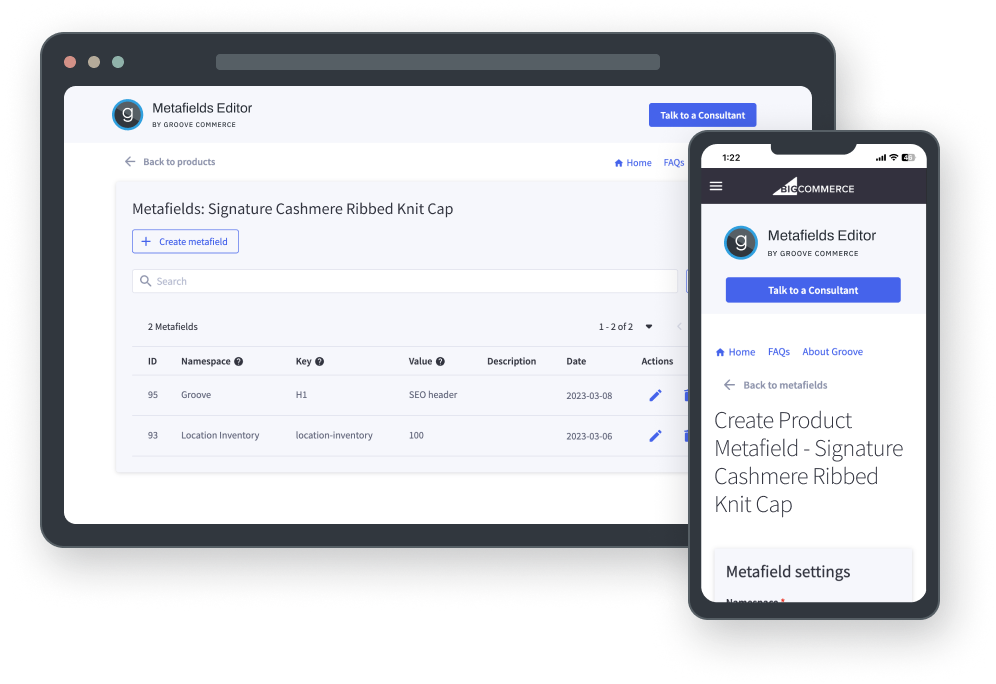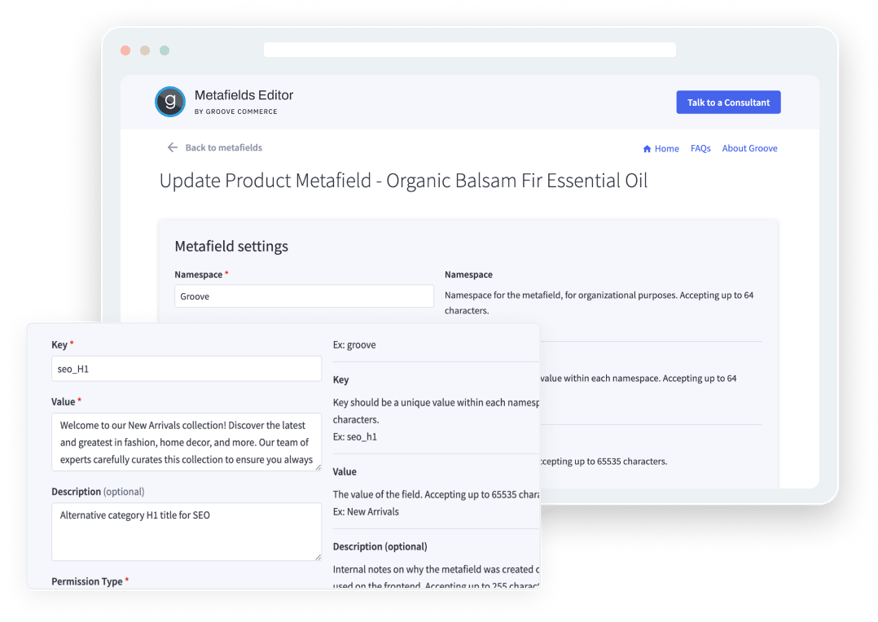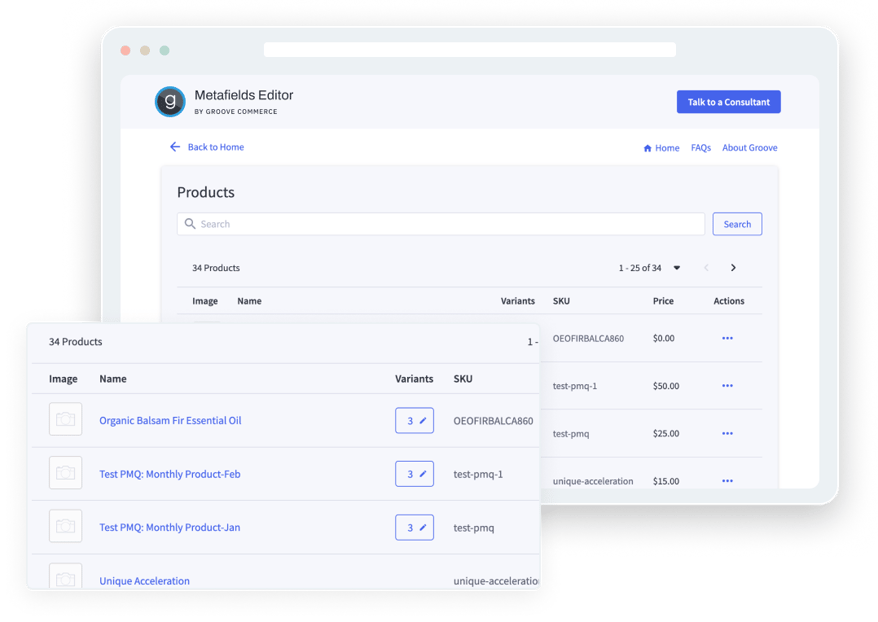BigCommerce Metafields Editor App by Groove Commerce
Our free one-click install app enables BigCommerce merchants to add custom data (unique key-value pairs) to orders, products, product variants, categories, brands, and channels once the respective theme has been modified to display the data as intended. This data is then used by search engines and customers to ensure the desired product is found and purchased.
BigCommerce’s out-of-the-box framework allows for a set number of product attributes such as Name, SKU, Price, and Description. Making use of metafields provides you with more flexibility in managing custom data across your online store.



Create & Edit BigCommerce Metafields With Ease
Brands often have other information they want to associate with the resources of their store (products, categories, etc.) such as warranty info and care instructions. Once the metafields editor is installed, BigCommerce merchants can view and edit metafields from a simple and easy-to-use interface.
Previously, all metafields had to be created and modified from the BigCommerce Developer API. This less-than-intuitive option only allowed for the creation of metafields for products, with no ability to batch edit products. With our BigCommerce metafield management tool, you can replace previous cumbersome workflows with streamlined processes of manipulating data stored inside of your BigCommerce store’s instance.
Notable Features:
- Extended Customization
- Ease-of-use
- Improved Organization

Installation, Setup, & Template Modification
If you have a BigCommerce store, installing our app is a breeze. Simply click “install” on our BigCommerce app store listing page, fill out the short signup form, and you’re ready to start. Once installed, you can create, update, and delete metafields with ease. Store any value up to 65,535 characters, over 250x more than the 255-character limit on BigCommerce’s built-in product custom fields.
However, it is important to note that your newly created metafields will not properly display until your theme file(s) have been modified to display the metafields in their desired format and location. For merchants who are technically inclined to make these changes, we have created an in-depth PDF guide and video tutorial with code examples that will assist you in getting your metafields displayed properly. If you are unable or unwilling to modify your store’s theme files, our team would be happy to provide an implementation quote.
Additionally, you can keep track of metafield data with our simple metafields settings and assign permission types for cleaner execution, visibility, and writability of fields by other API users.


Frequently Asked Questions
To address any concerns you may have, we have listed the questions we hear most about our BigCommerce Metafields Editor.
Not seeing your question answered here? Reach out by following the button at the bottom of this page to speak with a BigCommerce metafields editor expert.
BigCommerce metafields add more flexibility to the store as it allows store owners to add custom data to their products, customers, orders, and other resources in the BigCommerce store. Utilizing this data can add more custom experience for your targeted audience.
The benefits of using BigCommerce metafields include:
- Customization: Metafields enable store owners to add custom information to their store resources, which can be used to extend and personalize the functionality of their store.
- Flexibility: Metafields allow store owners to store any type of data, including text, numbers, images, and more. This makes them a flexible solution for adding custom data to a store.
- Integration: Metafields can be easily integrated with other third-party apps and services, allowing store owners to extend their store's functionality and automate certain processes.
- Improved organization: Metafields allow store owners to organize their data in a more structured and manageable way, making it easier to find and use the information they need.
Without the use of a metafield manager app like this one created by groove, in order to access and use the data stored in a BigCommerce metafield, you'll need to use the BigCommerce Management API.
Note: To access the BigCommerce API, you'll need to have a BigCommerce API key and an understanding of how to make API requests.
The specific use cases will depend on the needs and goals of a particular store. Here are some common use cases for BigCommerce metafields:
- Product customization: Store owners can use metafields to store additional information about their products, such as custom product descriptions, specifications, or images.
- Order management: Store owners can use metafields to store additional information about orders, such as order notes, delivery instructions, or custom order statuses.
- Third-party app integration: Metafields can be used to store data required by third-party apps or services, such as tracking information for shipping carriers or customer review scores.
- Header tag customization: Metafields can be used to generate customized H1 tags on category pages, offering increased flexibility for SEO.
In general, accessing and using metafield data will require additional resources and processing time. This is because metafield data is stored outside of the main data structure of your store, and retrieving the data requires making additional API requests to the BigCommerce API.
BigCommerce does allow a faster and easier way to access metafields to be used within the theme by using graphQL. However, this is limited to certain resources such as products and categories. Some resources may require a more involved process to retrieve the value, checkout BigCommerce GraphQL API Reference to learn more about the capability.
The maximum number of metafields allowed on each order, product, category, variant, or brand is 250 per client ID.
- Storage limit: Each metafield can store up to 65535 characters of data for the value and up to 256 for the description.
- Resource limits: Each resource, such as a product or category, can have up to 250 metafields associated with it. If you need to store more metafields, you may need to consider using a separate database.
- Naming restrictions: The namespaces, keys, and values of metafields are case-sensitive and can only contain alphanumeric characters, underscores, and hyphens. Spaces and special characters are not allowed.
The BigCommerce Metafields Editor by Groove Commerce serves as only an interface to add, modify, and delete metafields. Your store’s theme file(s) will need to be modified to display the desired metafield data properly. We provide in-depth documentation and a video tutorial which can be viewed here.
Our team has created code examples that can be leveraged as a starting point for implementing metafields on your website’s theme file(s). Until your theme files have been modified accordingly, the metafields you set up within our app will not display as intended.


